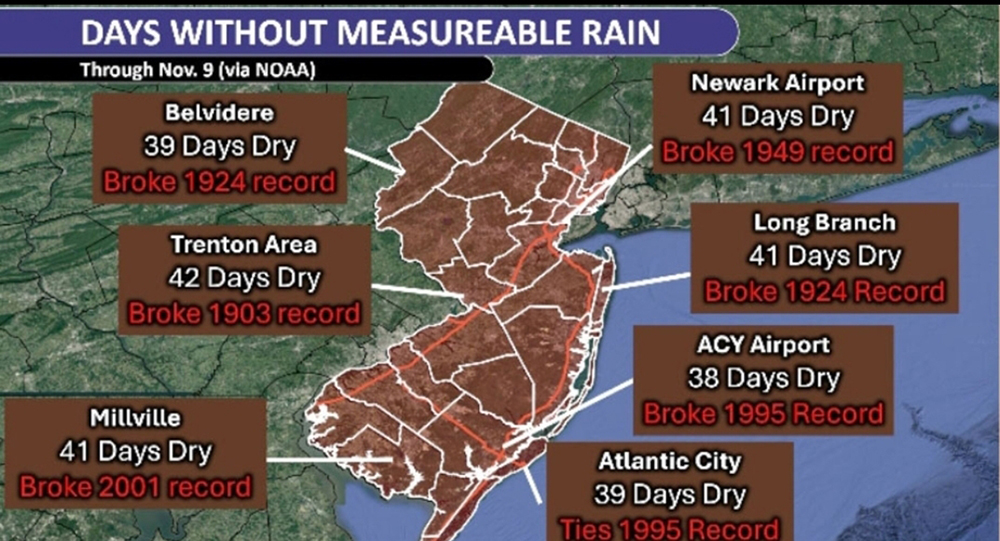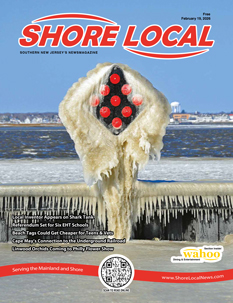By Meteorologist Joe Martucci
There are top 10 lists for everything under the sun at the end of the year. And yes, that means Jersey Shore weather as well. Welcome to the Jersey Shore’s Top 10 Weather Events of 2024 where I look at the most impactful, biggest, unusual and best meteorological phenomena that happened along our coast the past year.
In my opinion, this year’s top 10 list is top heavy. While there weren’t that many noteworthy events, what did occur made its mark. Let’s go through the list, from 10 to 1. (NOTE: All data is from the National Oceanic and Atmospheric Administration unless otherwise specified).
- Long-lasting September, ‘sunny day’ coastal flooding
The Sept. 16-25 streak was a good reminder that rain is not an ingredient for coastal flooding. The new moon, which brings higher-than-usual tides, as well as multiple storms passing well offshore, brought a long streak of tidal flooding.
Measurable rain only fell twice during this period and most of it was light. Winds were from the northeast, east or southeast every day during this stretch. With the storms offshore providing a long fetch of onshore winds, the flooding continued for a while. Thankfully, there was no flooding in the major flood stage.

- A chilly summer ocean
Upwelling, where chilly water near the seafloor moves up, replacing the relatively warm surface water, occurred more often than usual this summer, chilling ocean swimmers even as the thermometer on land soared. Ocean temperatures were in the 50s at times into August.
Upwelling is typically caused by winds out of the south and southwest. Thirty two percent of days between June and August – climatological summer – featured upwelling favorable winds at Atlantic City International Airport.
- Oct. 20-21 big temperature swing
Atlantic City International Airport had a 40-degree temperature swing on Oct. 21, the most during climatological fall, September through November. You went from winter coats to shorts in the course of a few hours. The morning low was 42 degrees, with the afternoon high hitting a summer-like 82 degrees.
The day before that had an impressive swing, too. Oct. 20 went from 39 degrees as a morning low to a 77-degree afternoon high. That’s a 38-degree jump and the third most for climatological fall.
- Norlun Trough brings snow on Jan. 19
It wasn’t how much snow fell, but why it fell that brings this to the No. 7 spot.
A rare Norlun Trough, a narrow band of heavy snow, cut through South Jersey and South Jersey only on that Friday. Somers Point picked up 5.3 inches of snow and Dennis Township picked up 4.9 inches, according to the Office of the New Jersey State Climatologist.
Meanwhile, typically snowier places like Newark Liberty International Airport only reported 0.6 inches of snow. Sparta, Sussex County, only had 2.0.
A Norlun Trough forms on the northwest side of a low-pressure system. Winds from different directions meet at that trough line, pushing upward. Upward motion creates snow.
See https://climate.rutgers.edu/stateclim/images/snow_20240119.png

- The highest pressure in decades on Dec. 14
The highest barometric air pressure since 1981 occurred at Atlantic City International Airport. Farther up the coast, Monmouth County Executive Airport in Wall had its highest-ever air pressure since records began in 1954.
ACY Airport recorded a maximum air pressure of 1047.4 millibars at 9:54 a.m. on Dec. 14. Most of New Jersey peaked around this level as well.
A few of you asked me what this meant for our weather. Really, it doesn’t mean much. There was much downward pressure pushing on us, which kept the sky blue. You probably didn’t even notice it, unless Queen’s chart-topping hit “Under Pressure” played on your speakers, which also came out in 1981.
- Lack of tornadoes and tropical systems
Not all top 10 weather events have to be bad. The Jersey Shore was spared from tornadoes. The lack of tropical systems meant fewer rip currents, fewer torrential downpours and less tidal flooding this season.
However, we do rely on tropical moisture during the late summer and early fall to provide precipitation and water for our use. This phenomenon is partially responsible for the top three events on this list.
- Hottest or second hottest year on record
“It is certain that 2024 will either rank as New Jersey’s warmest or second warmest calendar year on record,” Dave Robinson, the New Jersey state climatologist said in his November 2024 state weather recap.
Here’s how the state has fared so far:
Spring (March-May): Second warmest.
Summer (June-August): Third warmest.
Fall (September-November): Fourth warmest.
Meanwhile, January and February were both more than 4 degrees above the period of record average, which began at the state climate office in 1895. December will wind up close to the long-term average.
Human-caused climate change, whether through greenhouse gas emissions or the increase of urban heat islands, are largely responsible for this. The last year that was below the long-term average (51.9 degrees) was 2003 and that was by 0.1 degree. The last year the state was more than a degree below average was 1978.
- Record driest autumn on record
The Sen. Frank S. Farley State Marina in Atlantic City reported 2.19 inches of rain between September and November. That was the driest three-month period in the city’s lengthy period of record keeping, which began in 1873. To put it another way, this was in the top 0.0006% of three-month stretches there. Incredible. It beat the previous record, set back in 1895, by 0.33 inches.
Inland, Atlantic City International Airport reported 2.94 inches of rain during this time. That was the third driest three-month stretch in its 80+ year history and the driest during climatological fall. While good for enjoying Locals’ Summer, it created a significant issue that will carry over in 2025.
- Drought grips New Jersey
As we exit 2024, the Jersey Shore is in the most intense drought since 2002, according to the United States Drought Monitor.
https://droughtmonitor.unl.edu/CurrentMap/StateDroughtMonitor.aspx?NJ
Extreme drought, the third level of four, covers 49.4% of New Jersey as of Dec. 19’s update from the drought monitor. That includes all of Atlantic and Cape May counties.
The very dry autumn, due in part to a lack of tropical moisture, caused the state to issue a drought warning for the first time since 2016 on Nov. 19. New Jersey American Water immediately issued a mandatory conservation notice to all of its customers as a result. All non-essential water use was banned.
https://www.amwater.com/njaw/Water-Wastewater-Information/wise-water-use
Soil moisture is 20 to 50% below average for Atlantic and north Cape May counties as of the time of writing, according to the National Aeronautics and Space Administration’s Crop-CASMA reporting. Rivers and streams have flowed “much below” average up and down the Jersey Shore during the fall.
See https://www.drought.gov/states/new-jersey
Drought began on Sept. 10 in a small part of northern Atlantic County, according to the drought monitor. It began as a moderate drought, the first level of drought. Drought had spread to all of Atlantic and northern Cape May counties as of Oct. 15. By then, the western half of Atlantic County was in a severe drought, a Level 2.
The severe drought swept through all of the region by Oct. 29. The following week an extreme drought was declared, where we have been since.
As noted in the winter outlook a few weeks ago, the rest of the winter should stabilize drought conditions. However, I don’t see much improvement by the time spring arrives. That puts pressure on the early growing season months to have plentiful rainfall. If not, we’ll slip into conditions unprecedented in decades.
See https://shorelocalnews.com/the-jersey-shore-2024-2025-winter-outlook/
- The longest dry streak on record
The top spot goes to the all-time record longest dry streak, which occurred not just here at the Jersey Shore, but throughout the whole state.
Atlantic City International Airport went 38 days without measurable rain, from Oct. 3 to Nov. 9. Sen. Frank S. Farley State Marina went 39 days in a row, tying the previous record. This broke and tied, respectively, the previous record set back in 1995.
Our area was on the low end of the dry streak. Long Branch, Millville, Trenton and Newark Airport all went over 40 days without measurable rain, breaking all-time streaks. It felt like we were living in Southern California with all of the sunshine and dry weather during the fall. Some drops of rain did fall from the sky on occasion, but it wasn’t enough to even register in a rain gauge.
I put this over the drought and the record-longest autumn for a few reasons. Every major weather reporting station in the state broke or tied the all-time record. So, it wasn’t just our area.
So much has to occur just at the right time for this streak to occur. High pressures need to be in place, tropical storms need to avoid the area, cold fronts passing by need to be weak enough for rain not to accompany it. It also just took sheer luck. It doesn’t take much for a random 0.01 inch of rain to occur at one of the major weather reporting stations.
Not weather but worth mentioning
Not weather related but worth mentioning were three events we’ll remember for a long time.
The first was the April 5, 2024 earthquake. Centered in Hunterdon County, in north-central New Jersey, a magnitude 4.8 earthquake occurred at 10:23 a.m. That was the biggest rumble in the state since Nov. 29, 1783, weeks after the Revolutionary War ended, according to the New Jersey Department of Environmental Protection. Over 42 million people felt the shaking, including here in our area. Thankfully, the damage was minimal.
A few days later, on April 8, the Great North American solar eclipse occurred. Roughly 80% of the sun was blocked by the moon that afternoon at the Jersey Shore at its peak. However, clouds did ruin the experience for some of us.
Finally, we have to end with the Aurora of Borealis on Oct. 10. Pink and red glistened to the naked eye and if you pointed your phone camera at it, the colors just exploded on the screen (thank the lens for that extra effect). It was generational. I couldn’t stop smiling seeing it that night.
It’s fitting for Shore Local News Magazine, too. Cindy and Bob had us on an end-of-summer boat cruise around Atlantic City. The openness of the sea allowed us to all run to the edges of the boat to grab photos. Thanks guys!
New Jersey State Climatologist Dave Robinson and I will talk about all of this, on video on Dec. 31 in our Monthly Weather Roundup. Find it on my YouTube channel. It’ll be a half-hour-long and a perfect way to learn more about the weather as we go into 2025.
See https://youtube.com/@joemartwx
Joe earned his Meteorology Degree from Rutgers University. He is approved by the American Meteorological Society as a Certified Broadcast Meteorologist and Certified Digital Meteorologist, the only one in the state with both. He’s won 10 New Jersey Press Association Awards. You can find him on social media @joemartwx













